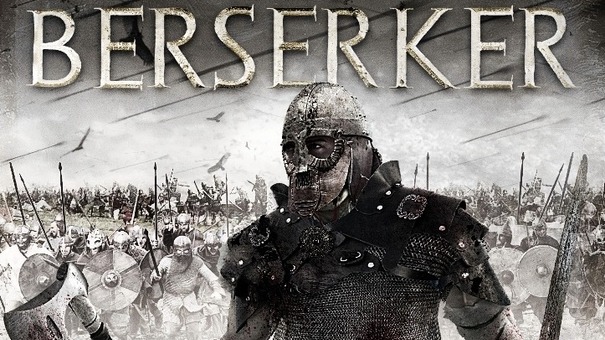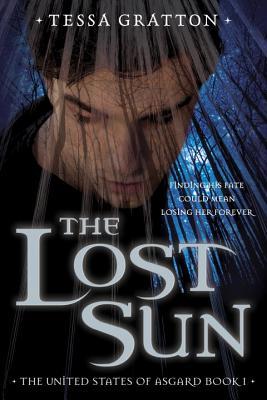
 Once upon a time there was a little girl (of 33) who loved to hear stories about the Norse gods. (i.e. Thor.) She thought the world they lived in was a fascinating one; full of honor, and destiny and love. She marveled at the gods bravery, audacity, devotion, and wondered what it would be like to live in a world where death was not always the end of ones life, but a fate filled beginning to a new one. Then one day this little girl (who liked to escape the throws of reality with fiction) was given a book called “The Lost Sun.” A book in which the Norse gods she found so fascinating no longer dwelled high above a world like her own, but ruled it. Where Odin ate dinner with the President. Where Berserkers raged against their inevitability, and one missing Sun god can turn the entire world into a river of tears. The little girl devoured the book…in one big bite, but much like Fenris Wolf (who longed to devour the sun to satiate her hunger) the little girl didn’t feel full. Something was missing.
Once upon a time there was a little girl (of 33) who loved to hear stories about the Norse gods. (i.e. Thor.) She thought the world they lived in was a fascinating one; full of honor, and destiny and love. She marveled at the gods bravery, audacity, devotion, and wondered what it would be like to live in a world where death was not always the end of ones life, but a fate filled beginning to a new one. Then one day this little girl (who liked to escape the throws of reality with fiction) was given a book called “The Lost Sun.” A book in which the Norse gods she found so fascinating no longer dwelled high above a world like her own, but ruled it. Where Odin ate dinner with the President. Where Berserkers raged against their inevitability, and one missing Sun god can turn the entire world into a river of tears. The little girl devoured the book…in one big bite, but much like Fenris Wolf (who longed to devour the sun to satiate her hunger) the little girl didn’t feel full. Something was missing.
When Baldur, son of Odin and one of the most popular gods in the country, goes missing, Astrid sees where he is and convinces Soren to join her on a road trip that will take them to find not only a lost god, but also who they are beyond the legacy of their parents and everything they’ve been told they have to be.”
Nonsensical openings aside, I have much to say about this book. The first and most important being that Tessa Gratton’s “The Lost Sun” is both enjoyable, and frustrating to read.
If you’ve had the chance to read some of Gratton’s work in the past (Blood Magic or The Blood Keeper) you are already familiar with her exceptional world building skills. Akin to fantasy novels (which in all honesty this book could sit easily in) Gratton tends to weave stories INSIDE of stories to help paint pictures. In the case of “The Lost Sun” the old stories are ancient Norse legends. The United States of Asgard is (for all intents and purposes) much like The United States of America. There is an active government (though they are only abstract in the book) states/holidays/landmarks with similar names (Colorada, Nordakota, Ohiyo, Hallowblot.) Even the mundane like SUVs and roadside roach motels. In short…nothing to really set it apart. Asgard doesn’t truly become Asgard until Gratton adds bits of the past. Why? Because Asgard is built on the characteristics of it’s inhabitants; the way they live, speak, rely on the lead of their gods. All of the things that have been established through family history, and lore.
Let me give you an example. The majority of TLS takes place on the road. The lead characters (Soren, Astrid, Baldur, Viker) are on a journey (it’s the entire premise of the book in fact) a journey that (unfortunately) leaves a lot of dead air. The characters fill this air with legends. Stories to (more often than not) illustrate their point, BUT it does more than that. These stories add depth. They explain why the people of a community act the way they do, why certain states worship certain gods. They fill in the white space and build up the world around the lead characters while they do nothing more than drive.
I’ll stop there so I don’t ruin the story, but it’s important to note that the book is FULL of stories just like this one.
Now, this is where it gets tricky…
All of these stories (though they are great for world/character building) also pull away from the active plot. I am a huge fan of flashbacks, especially when they are beautifully woven lore, but they aren’t for everyone. For instance, my reading buddy Tina would hate them. I’d even go so far as to say she’d skim past them (which makes me cringe.) While they are interesting and help create the world around Soren and his gang, they don’t necessarily make or break their journey. Soren (who happens to be the narrator of TLS) has a sordid past of his own, one that ultimately dictates his actions. The same can be said for Astrid and Viker. I love and appreciate this style of world building, others might not feel the same.
As for the plot itself, it was interesting but not thrilling (that was apparently saved for book 2 which I finished yesterday.) Soren is a Berserker. That means he is a big ol fat pile of steaming rage waiting to escape. However, Soren HATES the fact that he is a Berserker, so instead of his story being action packed and explosive (like you would expect from a Berserker) it’s chapters of self-loathing and uber self-control. (Deep breaths Soren…deep breaths.) Astrid (Soren’s soul-mate) is much the same. Calm and collected. She goes where the wind blows, quite literarily. I loved them as a couple. I think Astrid was good for Soren and vice versa, but their determination to be so…normal…made for a pretty blasé love story. With the exception of maybe one moment by a gate, their love story never had that “gasp” moment readers will talk about with passion. Baldur and Viker were easily the more interesting characters in the book. One because he was a god with amnesia, the other because she is a Lokiskin with some pretty serious anti-Loki issues. (Go figure.)
So what does all of this mean?
It means that “The Lost Sun” is a good book, but not a great book. That fantasy and folk lore fans will fall in love with the abundance of Norse history found between the pages, while others might find it cumbersome and tiring. It means that while the love story and journey of the characters was interesting, it wasn’t Earth shattering. It means that there is a chance you will both enjoy and be annoyed by this book. That Soren will make you want to punch a wall and Astrid will make you second guess your understanding of the word devotion. It’s dreadfully slow in some parts, but fast in others. AND…it’s ending is NOT what you will want it to be, but you’ll be happy to accept it anyways. In one word, this book is a contradiction. To itself and to how you will view it after reading the last page.
I say read it, if for no other reason than it’s sequel “The Strange Maid” is brilliant and having a little Soren hindsight is helpful when reading it.
Happy Reading my fellow Kindle-ites and remember: Don’t let fear determine your fate.
Add it to your Goodreads shelf / Amazon wishlist
| Rating Report | |
|---|---|
| Plot | |
| Characters | |
| Writing | |
| Pacing | |
| Overall: | 3.3 |






